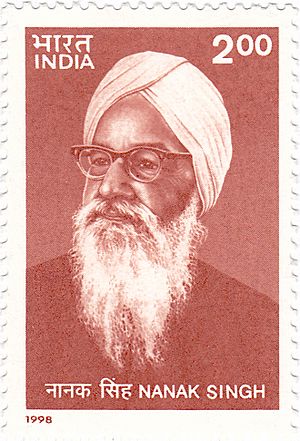Nanak Singh facts for kids
Quick facts for kids
Nanak Singh
|
|
|---|---|
 |
|
| Born | 4 July 1897 Chak Hamid in Jhelum district (now in Pakistan) |
| Died | 28 December 1971 (aged 74) Punjab |
| Occupation | Playwright, poet, Novelist |
| Nationality | India |
| Spouse | Raj Kaur |
| Children | Kulwant Singh Suri (son) Kulbir Singh Suri (son) Kanwaljit Singh Suri (son) Kartar Singh Suri (son) Kuldeep Singh Suri (son) Pushpinder Kaur (daughter) |
Nanak Singh (born Hans Raj on July 4, 1897 – died December 28, 1971) was a famous Indian poet, songwriter, and novelist. He wrote many books in the Punjabi language. His writings often supported India's fight for freedom from British rule. Because of this, the British government even arrested him. He wrote many novels that became very popular and won him important awards.
Contents
Early Life and First Writings
Nanak Singh was born into a family that wasn't rich, in a place called Chak Hamid in the Jhelum District (which is now in Pakistan). His birth name was Hans Raj. Later, he changed his name to Nanak Singh when he became a Sikh.
Even though he didn't go to a formal school for a long time, he started writing when he was very young. He would write poems about historical events. Later, he began writing religious songs. These songs encouraged Sikhs to join the Gurdwara Reform Movement, which aimed to improve how Sikh temples were managed.
In 1918, Nanak Singh published his first book, Satguru Mehma. This book was full of hymns (religious songs) praising the Sikh Gurus. It was his first book that sold well and became popular.
Fighting for India's Freedom
A very sad event happened on April 13, 1919, in Amritsar. British soldiers shot and killed 379 peaceful people during a rally. This event is known as the Jallianwala Bagh Massacre. Nanak Singh was there and two of his friends were killed.
This terrible incident made Nanak Singh write a long poem called Khomeini Visayans, which means Bloody Baisakhi. Baisakhi is the Punjabi New Year. In this poem, he criticized the British government. The British government was worried about his powerful words and quickly banned the book.
Nanak Singh also joined the Akali movement, which was a group working for India's independence. He became an editor for newspapers linked to this movement. The British government noticed his actions. He was accused of taking part in illegal political activities and was sent to Borstal Jail in Lahore.
While in jail, he wrote about the harsh treatment of peaceful Sikhs during a protest called the Guru ka Bagh Mocha demonstration. This was in his second collection of poems, Zakhmi Dil (Wounded Heart). It was published in January 1923, but the British government banned it just two weeks later.
During his time in prison, Nanak Singh wrote many novels. He wrote over 40,000 pages by hand in the Gurmukhi (Punjabi) script.
Awards and Popular Works
Nanak Singh received many awards for his writing. In 1960, he won Punjab's highest literary award. His important historical novel, Ik Mian Do Talwaran (One Sheath and Two Swords), published in 1959, won him India’s highest literary honor, the Sahitya Akademi Award, in 1962.
In 1945, he wrote a very popular novel that brought him great fame. This book was translated into Hindi and other Indian languages. His grandson, Navdeep Singh Suri, even translated it into English. In 1968, the book was made into a successful movie called (Pavitra Paapi). Nanak Singh also wrote the dialogue and screenplay for Dara Singh's Punjabi movie, Nanak Dukhiya Sub Sansar.
The Tribune magazine once said that Nanak Singh was the best-selling novelist in India for about 30 to 40 years. He wrote more than 50 books, including novels and short stories. He helped make Punjabi stories more about everyday life and less just about religion. He showed how characters and events in stories are connected.
In his novel Chitta Lahu (White Blood), Nanak Singh wrote about how society was losing its good qualities. In 2011, his grandson, Dilraj Singh Suri, translated Chitta Lahu into English, calling it White Blood. Interestingly, Natasha Tolstoy, who is the granddaughter of the famous Russian novelist Leo Tolstoy, translated Chitta Lahu into Russian. She even visited Nanak Singh in Amritsar to give him the first copy of her translated book.
Movies and TV Shows Based on His Books
- The 1970 Hindi-language movie Pavitra Paapi was based on his novel of the same name.
- His short story Sunehri Jild was made into a short TV show that aired on DD Punjabi.
His Legacy
Nanak Singh's 100th birthday was celebrated in 1997. To honor him, India’s Prime Minister Inder Kumar Gujral released a special postal stamp with Nanak Singh's picture on it in 1998.

